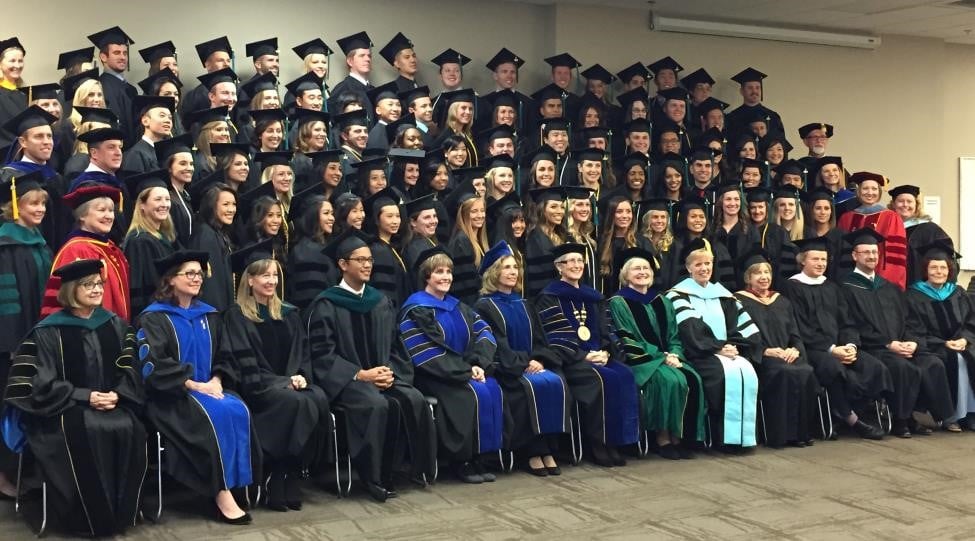
Nursing is a rewarding career with several graduate degree options. There are several paths to increase clinical knowledge and boost salaries. The American Association of Colleges of Nursing (AACN) projects a nursing shortage as baby boomers retire from the field1, making nursing a promising career path. Advanced nursing degrees equip nurses with better career options and leverage to negotiate salaries.
Whether you have a Bachelor of Science in Nursing (BSN) or are currently pursuing one, it can be advantageous to continue your education and earn a master’s in nursing. Following, we outline 10 types of master’s degrees in nursing, along with role specialties and potential salaries.
Table of Contents:
- Role Specialties for a Master of Science in Nursing (MSN)
- Role Specialties for Advanced Practice Registered Nurses (APRNs)
- Master’s Degrees in Healthcare Administration


Role Specialties for a Master of Science in Nursing (MSN)
There are various options when pursuing an MSN, including specialized roles. Adding a nursing role specialty to a Master of Science in Nursing (MSN) program allows you to work toward a rewarding career and higher salary. Here are four types of role specialties to consider.
1. Nursing Informatics
As one of the emerging types of master’s degree in nursing, nursing informatics is a cross between nursing and technology. The medical field uses several technologies to help patients who regularly receive care. Nursing informatics teaches nurses to consult on new technologies and analyze data to reach healthcare goals. Nursing informatics also prepares nurses to make data-based decisions.2
2. Clinical Nurse Leader (CNL)
With a clinical nurse leader (CNL) certification, work alongside healthcare professionals to improve patient clinical care and outcomes. As one of the types of a master’s degree in nursing, a CNL is prepared for leadership and management roles in nursing. A CNL’s duties include finding ways to reduce nurse turnover rates, protecting patient health and safety and staying informed on current healthcare research.
3. Nurse Researcher
Do you enjoy research? Consider an engaging career as a nurse researcher. Nurse researchers assess and analyze research data and provide recommendations based on findings.
4. Public Health
Public health helps communities adopt better health practices. Nurses in this specialty also partner with state and local governments to prevent the spread of infectious diseases. For example, during the height of COVID-19, public health nurses in Indonesia played a critical role.3 This career path teaches you to analyze outcomes and advocate for public health goals for different communities.
5. Nurse Educator
If you’re passionate about nursing and love empowering others with knowledge, you may want to become a nurse educator. Teach the next generation of nurses in classrooms and provide continuing education to licensed nurses in a clinical setting. As one of the types of master’s degrees in nursing you can pursue, this specialty combines nursing and teaching. In this role, you may present at conferences and consult with healthcare organizations. This path also requires you to stay current on the latest healthcare research.
6. Nurse Administrator or Executive
A nurse administrator or nurse executive is a promising leadership position for those who earn an MSN. You can gain additional training and certification to advance your career. There are various leadership positions within a healthcare organization you can work toward, such as a manager of a unit.
Role Specialties for Advanced Practice Registered Nurses (APRN)
There are different levels of nursing, and becoming an Advanced Practice Registered Nurse (APRN) allows you to gain a critical skill set and assist a specific population, such as geriatric, pediatric and mental health patients. To become an APRN, you can pursue various types of master’s degrees in nursing programs to specialize in different areas of healthcare. Here are the roles you can pursue.
7. Clinical Nurse Specialist (CNS)
A clinical nurse specialist (CNS) often assumes leadership roles and serves as a specialist at healthcare facilities. A CNS may work in acute care, geriatrics or in another area. A CNS’s responsibilities include treatment, research and staff management.4
8. Nurse Practitioner (NP)
Nurse practitioner (NP) represents one of the types of master’s degree in nursing you can pursue. It’s a role that can open doors within many healthcare settings. NPs work with a range of populations, diagnose and treat patients and also prescribe medications.5
9. Certified Nurse Midwife (CNM)
If you want to be a part of the birthing process, consider a role as a certified nurse midwife (CNM). CNMs work with families during pregnancy as well as the postnatal period. Depending on the state, CNMs may work in hospitals, OB/GYN clinics, birthing centers and more.6
10. Certified Registered Nurse Anesthetist (CRNA)
Certified registered nurse anesthetists (CRNAs) often have one of the highest nursing salaries. A CRNA’s position is crucial, as they administer and monitor medications for patients undergoing surgery who require anesthesia.7 CRNAs work at hospitals and surgical clinics and in oral surgery.


Master’s Degrees in Healthcare Administration
With an advanced nursing degree, you can work in healthcare administration. In this role, your work is more behind the scenes, and you oversee the day-to-day operations of healthcare facilities.
11. Master of Business Administration (MBA) in Healthcare Management
If you’re business-focused, earn a Master of Business Administration (MBA). MBA graduates have the potential to command high salaries, with roles such as Medical and Health Services Managers reporting a 2023 median pay of $110,680 per year.8 Additionally, an MBA may open doors to diverse career paths, including medical device or pharmaceutical sales opportunities.
12. Master of Healthcare Administration (MHA)
With a Master of Healthcare Administration (MHA), you may pursue various leadership roles in healthcare. You may work in healthcare operations management, data-driven healthcare and health policy. You can also work for health insurance companies or as a risk and insurance consultant.9 

Four Paths to a Master of Science in Nursing (MSN)
As we’ve explored various nursing degree types, it’s important to understand there are different routes to obtaining your MSN. Below, we list four common paths so you can choose the one that fits your lifestyle.
1. Registered Nurse (RN) to MSN Bridge Programs
Registered nurses with an ADN can pursue an MSN as a part of an accelerated program. At USAHS, our online RN to MSN program lets RNs with their ADN and one year of experience enroll directly into our MSN program to advance their education and elevate their career.
2. BSN to MSN Programs
Those with their BSN can enroll in a BSN to MSN program. This allows you to continue your education and expand your credentials through an MSN program. Consider the online BSN to MSN degree program at the University of St. Augustine for Health Sciences (USAHS).
3. Dual Master’s Degree Programs
There are many specialties within nursing. A dual master’s degree is a great way to work toward a high-level career in healthcare management. There are several dual master’s degree in nursing programs, such as an MSN/MBA for the business-focused, and others like MSN/MHA for those who want to work in healthcare administration.10
4. Direct-Entry Master’s Degree Programs
Direct-entry master’s programs are for those coming from a different field who don’t want to start from the beginning and earn a BSN. Apply for a direct-entry program to earn an MSN.


FAQ
Earning an MSN is exciting and prepares you for a rewarding career in nursing. Below, we answer some of the most common questions about pursuing an MSN.
How Long Do Master of Nursing Programs Take?
The time it takes to complete different types of master’s degree in nursing programs varies depending on the program and other factors. For example, at USAHS, earning an MSN can take an average of two to 3.7 years.*
Are All Master’s Nursing Programs the Same?
There are different types of master’s in nursing and several role specialties. There are graduate degrees for nurses, dual master’s programs and specialized public health and education programs, for example.
Which Master’s Program for Nursing Pays the Most?
According to the Bureau of Labor Statistics, nurse anesthetists typically make the most compared to other nursing fields.11
Should I Pursue an FNP or DNP?
You can choose to become a Family Nurse Practitioner (FNP) or pursue a Doctor of Nursing Practice (DNP). But there’s also the option to get your DNP degree with FNP as your role specialty. Keep in mind that while a DNP program gives you more flexibility, it does require more time to earn a doctoral-level degree.
What Is a Master’s in Nursing Called?
A master’s in nursing is a graduate degree also called a Master of Science in Nursing (MSN). The MSN degree is a program that offers practicing nurses the education and expertise that is likely to lead to expanded career opportunities. An MSN prepares nurses for practice at the advanced level.
Pursue a Graduate Nursing Program Today
With the various types of master’s degree in nursing programs, find one that aligns with your goals and interests. If you’re ready to pursue a career in nursing, the USAHS School of Nursing offers a supportive, flexible and personalized graduate school experience. We offer different paths to earn a Master of Science in Nursing (MSN).
To advance within a thriving profession, apply today.
*Time to completion may vary by student, depending on individual progress, traditional vs. accelerated pathway, credits transferred and other factors.
Salary data may not reflect starting pay for recent graduates.
Sources
- American Association of Colleges of Nursing, “Nursing Shortage Fact Sheet,” AACN, May 2024, https://www.aacnnursing.org/news-data/fact-sheets/nursing-shortage.
- Cathy Menkiena, “The Three Essential Responsibilities of a Nurse Informaticist,” Health Catalyst, February 2, 2021, https://www.healthcatalyst.com/insights/nurse-informaticist-3-essential-responsibilities.
- M. Agung Akbar, Neti Juniarti, et al., “The Roles of Community Health Nurses’ in Covid-19 Management in Indonesia: A Qualitative Study,” National Library of Medicine,”International Journal of Community Based Nursing & Midwifery, April 2022, https://www.ncbi.nlm.nih.gov/pmc/articles/PMC8957658/.
- Lana Bandoim, “What Is a Clinical Nurse Specialist,” Verywell Health, October 12, 2023, https://www.verywellhealth.com/clinical-nurse-specialist-5323860.
- American Association of Nurse Practitioners, “Standards of Practice for Nurse Practitioners,” AANP, 2022, https://www.aanp.org/advocacy/advocacy-resource/position-statements/standards-of-practice-for-nurse-practitioners.
- WebMD Editorial Contributors, “What Is a Nurse-Midwife?” WebMD, February 20, 2024, https://www.webmd.com/a-to-z-guides/what-is-nurse-midwife.
- UnaSource Surgery Center, “Facts About Crna Education & What a Nurse Anesthetist Does During Surgeries,” UnaSource Surgery Center, https://www.unasourcesurgery.com/crna-education-nurse-anesthetist-during-surgeries/.
- U.S. Bureau of Labor Statistics, “Medical and Health Services Managers: Summary,”BLS, April 17, 2024, https://www.bls.gov/ooh/management/medical-and-health-services-managers.htm.
- Sheryl Grey, “Earning A Master’s In Healthcare Administration: Here’s What You Should Know,” Forbes Advisor, May 23, 2024, https://www.forbes.com/advisor/education/healthcare-administration-masters-degree/.
- Nursing License Map, “Dual Nursing Degree Programs,” Nursing License Map, January 2022, https://nursinglicensemap.com/nursing-degrees/masters-in-nursing/dual-degree/.
- U.S. Bureau of Labor Statistics, “29-1151 Nurse Anesthetists,” BLS, May 2023, https://www.bls.gov/oes/current/oes291151.htm.








